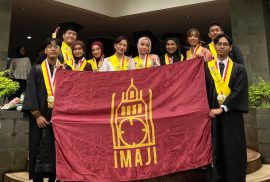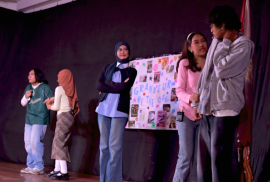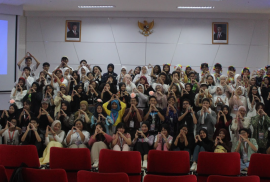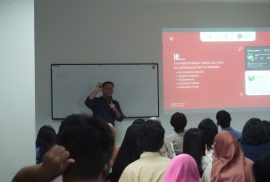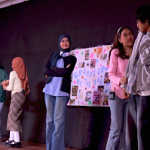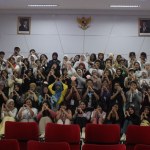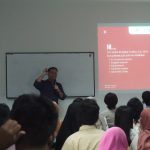A repost from an Obituary to Prof Stephanus Djawanai by Achmad Munjid, PhD
Our FIB UGM team had just finished presenting their study findings at the Jayakarta Military Command Headquarters when they received the unfortunate news. “Pak Steve has passed away,” stated Mbak Wening Udasmoro, the group’s leader and dean of the FIB. She informed her colleagues about the WhatsApp message she had just received. Prof. Stephanus Djawanai, MA, passed away yesterday afternoon, August 31, 2018, at 13.40 WIB. The cheerful man born in Bajawa, Flores, on October 10, 1943, had passed away at the age of 75.
We feel completely lost.
Prof. Stephan Djawanai is an eloquent and motivating lecturer. He will bring warmth and kindness to everyone inside and outside the classroom. His students and co-workers are Muslims, while he is a Catholic. However, religious differences do not divide us. He consistently has an exceptional ability to make students comprehend the stuff he delivers. He is adept at creating “teaching moments.” Occasionally, he uses humour to ensure that students comprehend the material and are excited to hear it. Intellectual illumination is always what makes the learning process interesting.
One morning in my first-year English Literature lecture at UGM, my classmates and I eagerly listened as Pak Steve presented a tale about a couple who were divorcing after a heated argument and whose case had to be taken before the court. When the judge inquired as to the primary cause of their argument, it turned out to be a simple matter: coffee. “Is it true that the explanation involves a cup of coffee?” the judge inquired once again. The spouses nodded their heads in agreement. The judge shook his head, astounded. “How does that make sense? Why do you two want to get a divorce over a cup of coffee? “questioned the Judge “That’s the thing, Your Majesty. I also was unable to comprehend it. My wife became so upset when I said, “Where’s my coffee?” The spouse responded. “Your Majesty, neither the coffee nor his comments to me are important,” the wife said aloud. Again, the Judge said, “So what’s the issue?” “His tone of voice, Your Majesty. His intonation! The tone of his words stripped me of all my human dignity and value!”
Well, from that story, Pak Steve gave us the point, don’t play and take intonation lightly. In pragmatics, intonation is very, very important. Intonation can make the message conveyed effectively. But on the other hand, it can lead to misunderstandings that have fatal consequences, as in the husband and wife’s case. that is how Pak Steve transferred the message of the story to his students. The way he teaches makes concepts that seem complicated to be simple, authentic, clear, relevant and exciting.
Another time, Pak Steve alternately looked at my face and the yellow attendance list card in his hand. In the past, each student was required to sign the yellow card for each meeting as proof of attendance. Above the student signature column is the lecturer’s signature column. In the middle of the semester, apparently, my signature on the yellow attendance card was less than half of Pak Steve’s signature; undeniable proof that I did not attend the class so many times. He wasn’t angry, but his face wasn’t as cheerful as it used to be. “You are in trouble, my friend. If you disappear again from the class, your grade will disappear forever,” he said. The whole class laughed, but the message I got was completely different. I became more diligent in coming to class after that incident.
When I finished my undergraduate thesis under the guidance of the deceased Prof. Soebakdi Soemanto, Pak Steve became one of the examiners. I remember his question exactly, and that’s probably the only part I remember about my thesis exam to this day. “So where is the meaning of the text?” he asked. His eyes were sharp. His smile bloomed. His entire body movement was an attitude of trust and hope.
“According to structuralism, every text consists of interconnected elements to build a structure. The meaning is in the relation between the elements that make up that structure….” “Stop! Excellent!” he immediately cut off the sentence that I was still going to continue. “Enough, enough, enough. No need to continue! You are right to the point!”
With a Masters’s and PhD degree from one of the best campuses in the US, the University of Michigan, Pak Steve is an intellectual who has been familiar with “discourse analysis” and the thoughts of Derrida, Foucault, Roland Barthes etc., since the early 1980s when only a few people in UGM discussed the names and ideas of these French thinkers. Ten years later, people are exposed to the “posmo” epidemic and are familiar with their thinking. His passion for language and culture led him to become a professor at UGM in 2009 with a captivating speech entitled “Study of Language, Study of Humans”. As an academic who departed from the outskirts of Flores, one of the things that bothered him was the trend of the disappearance of local languages in the midst of the swift global currents. He believes that the loss of a language means the extinction of a group of ideas because the loss of a language means the loss of the human way of knowing and accumulating knowledge, the loss of a distinctive way of expressing experience, reality, and life. For him, The low variety of ethnolinguistics is a severe problem that has a fundamentally negative impact on humanity. On the other hand, a high variety of ethnolinguistics has excellent potential to contribute to solving human problems and maintaining human humanity.
After 40 years of serving as a lecturer at English Studies Programme, UGM, Prof. Stephanus Djawanai returned to his hometown and was appointed Chancellor of the University of Flores for the period 2012-2016 and 2016-2020. That’s how he took to “pay back” his hometown after spending more than half of his life overseas. However, last July, he was forced to resign from the position due to his prolonged illness for the past few years. Pak Steve also decided to return to Yogyakarta and passed away peacefully at his home in Minomartani after being hospitalized many times. Last Eid, when we visited his residence, he still seemed eager to talk and make jokes, even though his physical appearance seemed increasingly frail. He also spoke about death with a calm look, as if it was the signal. Yesterday, that moment came.
Goodbye, Pak Steve. May you rest in eternal peace. Your passing profoundly saddens us. But we are always proud and grateful to remember your services, kindness, and legacy as a teacher.
Thank you so much, though it will never be enough. Respect!
Yogyakarta, September 1, 2018
Translated by:
Najma Aulia Jauharnafisa
Faricha Adzkia Hamida
Edited and Proofread by:
Adiba Qonita Zahroh, S.S., M.Litt.

